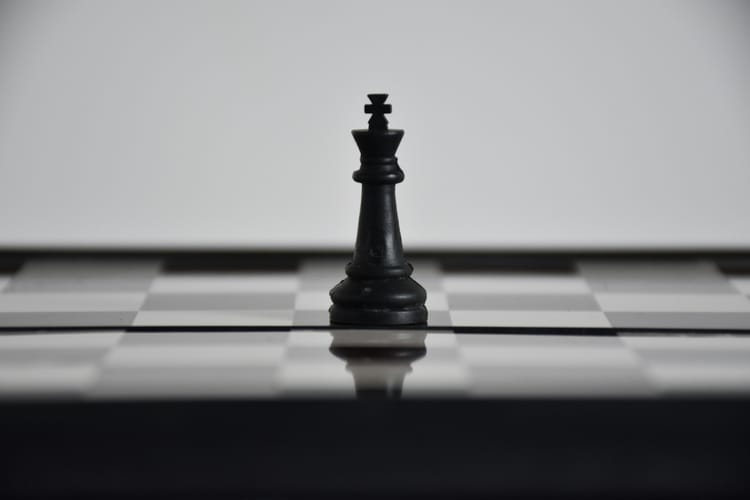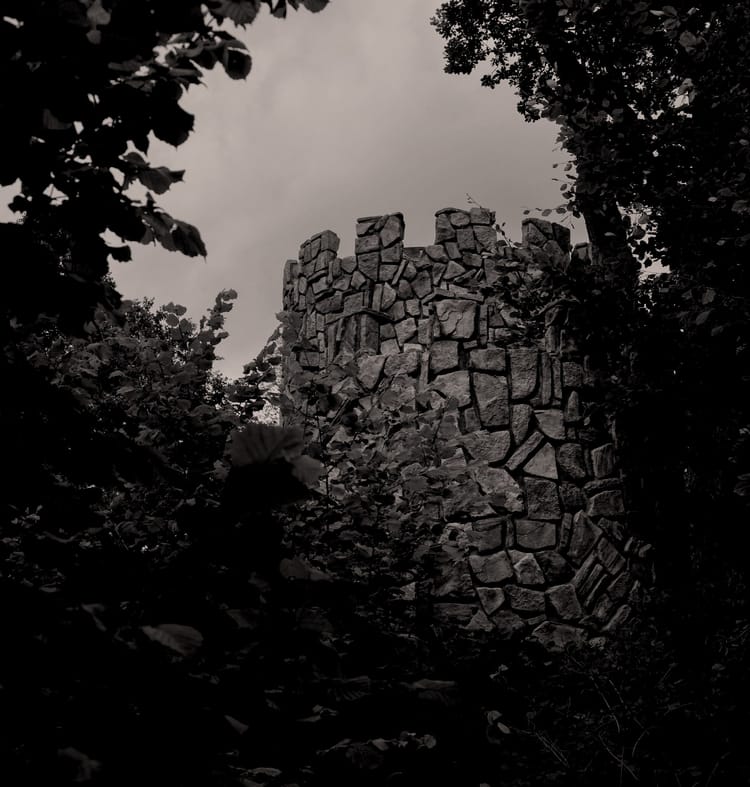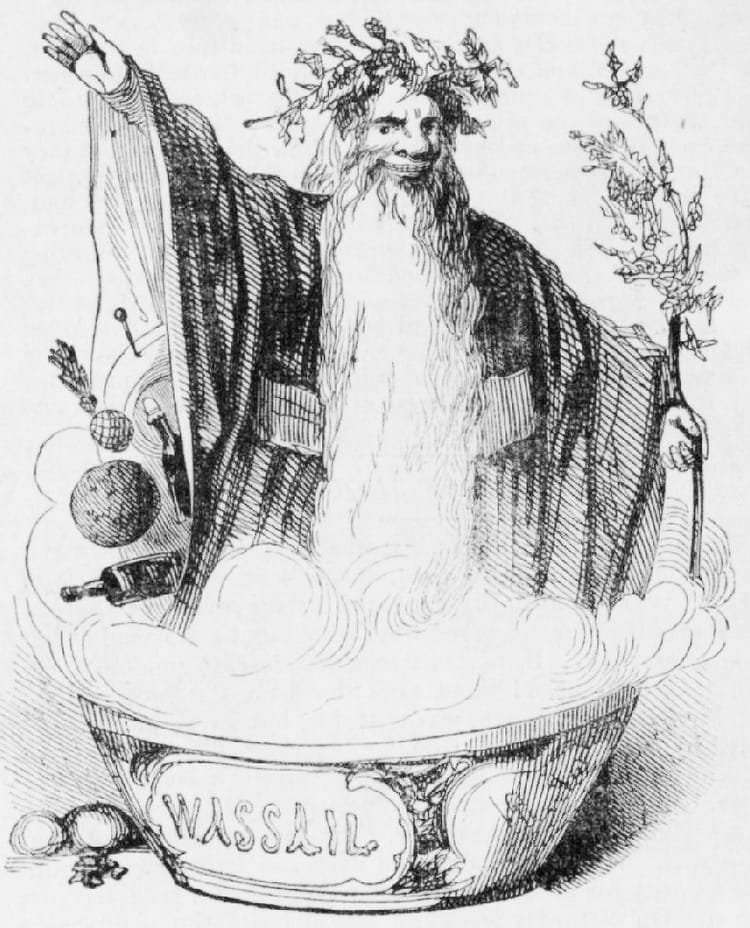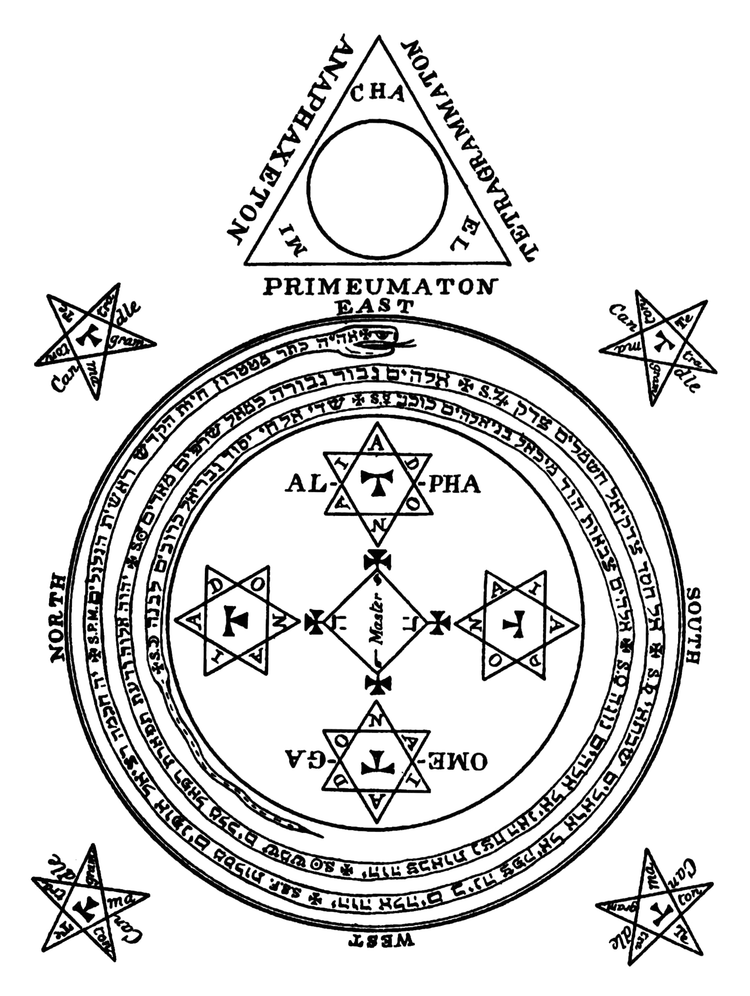New Moon: To do more with less

It's Friday. Hello. Thank you for bearing with my absence last week. The situation that stole me away was potentially serious but has since resolved and was followed by a singularly magnificent weekend.
I've now still dealt with a myriad of connected and disconnected things this week, some of which are weighing on me today in particular; and therefore I suspect that today's post will be relatively short. However, the topic I had settled on is rather well suited for brevity, perhaps even demanding it. I have asked myself: what exactly are the merits of asceticism — of deliberate abstinence from things which give pleasure, whether or not the pleasure itself is good?
This question branches from things I wrote in spring of 2023 about whether there can be purification without sin and what the difference is between indulgence vs. "living deliciously." Rather than fully reiterate what I said at that time, for introductory purposes I recommend (re)reading those posts; in summary, I tend to come down on the side of hedonism, inundation, and extravagance, especially in contrast to Christian morals. As a ritual practitioner, I find more largely prevails over less in the ecstatic portion of my rites, echoing the abundance of my fertility work. Nevertheless, people who know me rather well may also know how I have a near-compulsion for shedding possessions instead of hoarding them, and how I may sometimes appear dead set on minimizing my exposure to various portions of the internet. And if you've seen this side of me, it's still only a glimpse; at my core, I feel a deep pull toward living with only that which is necessary. How can this relate to my equal pull toward the maxim that fulfilling any desire is good if it does not interfere with others' ability to fulfill theirs?
I think the instances in which I understand and accept asceticism are approximately threefold, and now I will work through each to try and integrate them into my wider hedonistic view.
I. Living sustainably takes a kind of simplicity
Capitalism forces austerity on the "have-nots," but for the "haves" it uplifts visible consumption and makes endless acquisition a permanent life goal. Such is the profit motive: why have merely what you already possess, when you could possess more? And to support that craving for more, more, more, other human beings and our very ecosystems are now dedicated to that destructive, entropic purpose. We know, whether all of us admit it or not, that to remove the existential threat that a few humans have created toward most if not all life, we must operate more sustainably than what capitalism posits.
This applies most to the ultra-wealthy, of course, and there are many ways in which I couldn't care less what I and the people around me who make only the tiniest fraction of a billionaire's net worth do with our consumption habits or carbon footprint or what have you. Nevertheless, each one of us is responsible for not letting ourselves become avaricious enough to turn into the next set of billionaires. I have lately tried to conduct my life in ways where I do not need an excess of anything; it's only a beautiful happenstance when I manage to incur excess in certain arenas, from time to time. This ethos is not the same as denying myself the bare minimum to survive, nor is it the same as denying myself all pleasure for lack of having a sustainable source — for one thing, some pleasure is part of the bare minimum to survive, and for another thing, the more-than-human world is no stranger to occasional waste, because sometimes what's waste in the short term is regenerative in the long term. But I believe in a kind of simplicity where quality is favored over quantity, and where the choice of what to value is significant, as is why you value it.
A large collection of books can be valuable, but I'd argue it's less likely to hold that value if the person who possesses them has never read (and will never read) them. I love books, but all too frequently I'm gifted books that I can't be bothered to open. Periodically I shrink my library by clearing out the books that I suspect are merely going to take up space forever.
A large collection of kitchen gadgets can be valuable if someone spends a lot of time cooking, and a large collection of art supplies makes absolute sense for an artist. A large collection of clothing makes sense for someone either who lives in a place where they need to seasonally rotate how they dress, or who performs a wide variety of activities that create diverse wardrobe requirements, or who performs a narrow class of activities but in an area where they will need to change clothes often (for one reason or another). But gathering these things as a matter of performance is fairly unpleasant. Even gathering these things aspirationally does not really make sense to me unless, say, the only thing standing between you and your art career is just a lack of tools — and not also a lack of time.
I do not want a house that's any smaller than the house I have, but I don't need a house that's too much larger either. I think it's reasonable that I ask for something with multiple rooms and levels to accommodate all the different things I enjoy doing in my home; but I have no idea what I would do with an entire mansion, and I understand why many people can live perfectly happily in tinier homes than I do. Provided, that is, the home is clean and safe, under their own control, and able to give them a direct relationship with the land instead of making them function like a cramped, isolated bee in an urban, concrete honeycomb.
I say all of this and of course I'm not sure whether I really abide by what I'm saying. I do collect a few things by habit. Clothes, as mentioned above: I can't yet afford many truly durable clothes, so I err on the side of just having a lot of garments I can cycle through and avoid turning anything into rags too quickly from overuse; combine that with actual seasonal factors and I do own far more outfits than a lot of ordinary people would have worn even fifty years ago, never mind five hundred years ago, and I don't really like that feeling. Meanwhile I collect things like jewelry, makeup, and nail polish, and although having a little variety in those things makes sense, I've been feeling the need to cut myself off after a certain point, or at least give away some of my older things if I'm trying to have novelty. I also collect tarot decks and stones for equally meditative and aesthetic purposes. I once collected fancy letter openers. If I had the finances, I would be someone who collected footwear.
But even bearing these things in mind, I know I collect any of these items at a far slower rate than many other people do. I don't let myself go into debt over them[1], I limit deliberate shopping for these items to about 2-3 times per year, and I resist most impulse buys outside of those situations. I can feel my rate of acquisition slowing down, too. I can only store so many of these objects. No matter how strong my interest in them can become, what I desire even more is to not have clutter. If I don't have room for the thing, I will only rarely justify getting it anyway.
I wasn't always like this. As a child and teenager, I was a pack rat and held onto just about everything for some barely-applicable sentimental value. If I wanted more than I could store, then the problem was storage, not what I wanted. Still, I was restrained from outright hoarding by how my parents wouldn't just get me anything I asked for, and my allowance money was fairly small for my parents' combined income bracket pre-divorce; post-divorce, I also learned from the days of the week I spent in my mother's custody that sometimes it wasn't even possible to get things you wanted. Going into college, I wasn't a starving student but I was supported only minimally, even though my father could have done more. I am not at all grateful for his overt libertarian attempts to make me bootstrap myself, and in fact our long-tortured relationship's problems often derive from just how withholding he really was; regardless, I know that in my earliest days I was just grasping and stubborn enough that I would have tipped into some very aggressively consumerist habits if not for parental interventions.
And then came the time when I learned the perils of my own innate tendencies — not as I became totally financially independent, but rather as I lived with someone who was the hoarder I couldn't yet become. My abuser coped with a number of her serious emotional problems by buying all kinds of things she didn't need and never even used, or she'd use once and then forget about. She would also strongarm me into buying these things for her, or she'd use one of our credit cards. When we lived together we were poor enough without needing to pay those particular bills, but her habits made it all the more difficult to survive. The floor of our apartment often could not be seen. Non-human creatures started making their home in the sheer aggregation of Stuff. Important things got lost, drowned under trivialities. Besides the emotional and sexual agonies of how I was being treated, I felt as if I lived in a physical hell that I was being forced into perpetuating.
After all of that, some people might say I've swung too far in the opposite direction, disposing of or rejecting things I might actually need one day just because I can't see an immediate function. At times I'll clean up the kitchen while my owner is cooking, and I'll throw something out that he wasn't done using, because I saw an apparent waste object sitting there and I had to make it disappear. So I am still relearning, after 15 years, what is the right way to navigate such struggles.
But mostly I'm content with my preference for shedding possessions and avoiding new ones outside those few collectible categories. And I've even begun to feel more drawn to intentional ephemerality — letting my data online destroy itself on a schedule, and choosing not to take photos or grab souvenirs of everything I want to remember. Sometimes the past is worth materially preserving outside of my memory, but sometimes there are cases where I think whatever can't fit into my memory directly is worth releasing to the sands of time.
I dream of a world where I own slightly more than what I absolutely need, but where the abundance of the Earth is more to be found outside my home than within it. I do not need to own that — only to have access to it.
II. Reducing dependency on pleasure
Besides my attitude toward hoarding, there is something I struggle with much more routinely. That is addiction.
I am a sugar addict. I don't mind describing it that way. It's not a moral assessment. It's an observation — which does come with some distress, but not at the supposed audacity of enjoying my food, nor at how if I ate less sugar I would weigh less and conform to more of a certain beauty ideal. In fact, I don't know how much less I would weigh if I cut out sugary food completely, and I am fairly certain I was never destined to be thin, as the combination of my bone structure and height probably forbids that. Instead, my distress is that regardless of numbers on a scale or a measuring tape, I know the amount of sugar I consume (especially what I used to consume) is not good for my long-term health, and I know I am only sometimes eating sugar for arbitrary joy; I'm somewhat emotionally dependent on it, plus I've frequently used it as a quick and easy energy source compared to the executive function struggles I've had around preparing more complex, healthier food. I cannot simply leave a sweet food somewhere in the house for a rainy day; unless it's pre-committed to a special occasion, I'll eat the thing within a week, and it doesn't matter how much other sugar I've already had in the same week.
That's not the way my body evolved to process sugar, and I'm afraid of becoming diabetic like my mother. I feel physically unwell when I've had sugar over a certain threshold for several days. I see no reason to "quit" sugar — abstinence there strikes me as unhealthy and harder to follow than a small amount here and there — but over the last couple of years I have created more and more rules for myself about when sugar is okay to eat and when it isn't. My hope is to continue enjoying the gift of its sweetness, the beautiful taste every simian craves as our ancestors sought fruit above all other foods; but I do not want to depend on it as I have before.
Other substances have not affected me as profoundly as sugar has, but I know that when my body (or at least my brain) enjoys something a great deal it becomes hard not to seek that thing all the time. I've avoided certain drugs out of a profound mistrust in my ability to avoid addiction therein; in other cases, I've been glad that I don't like what I have to do to consume them (e.g. smoke cigarettes for nicotine[2]) or that the effects are mixed enough for me to reserve consumption for specific situations automatically (e.g. cannabis or, apparently, psilocybin). I massively suspect I would have become an alcoholic in my 20s if I'd had more money for it, and now I've been spared through suddenly changing from a seven-drink drunk to a one-drink drunk who gets unpleasant hangovers even if I hydrate enough; I still love the taste of wine, cider, many spirits, and some beers, but not enough to punish myself on a nightly or even weekly basis. In a more strictly behavioral vein, I try to use loose mental time limits on my video gaming, and very severe budget limits on gambling, and I know there's an alternate timeline of my life where I spent much more time and money on porn and anonymous sex than would ever have made sense.
Again, there is no real abstinence here, with the exception of heroin and cocaine. But as much as I cry, "Indulge!" as a form of resistance to drudgery, nowadays I also feel more interested in indulgences that won't shackle me — that won't become a new, nonconsensual master besides the bosses. Anything can be addictive if you let it, so there's no true class of special vices to avoid while having innocent fun with everything else; I'm only trying to act conscientiously when I choose what to enjoy the most.
III. Ecstasy through absence
Some parts of my life will never be simple, spartan, austere. When it comes to kink, that most openly ecstatic pursuit of mine, I will always focus more on the more. Torture me with an explosion in my senses; or if you must, deprive me of only one sense for the sake of enhancing all my others. Control my sexual fulfillment by forcing me to come over and over; do not lock me in chastity. Give me so much of what I desire that I might regret asking for it; but do not take it away just so I'll beg to have it returned.
However, I know other people operate differently. For some, the most profound ecstastic transformation occurs through being exposed to nothing at all. The experience is still an experience — of the void. Of asking, and never receiving.
And outside of the erotic realm, I feel as if in growing older I've started to enjoy that kind of simplicity myself, in fact going so far as to not even ask for that which is missing. I don't have "FOMO" in most things — I like doing exactly what I am doing, while intentionally not trying to do what someone else does. I'm no longer an overachiever in some of the areas I once was, and I'm even further away from becoming one in the areas I wasn't. I miss some activities I haven't been able to do in years, but I don't miss trying to do so many activities at once.
Four years late, I'm playing Animal Crossing: New Horizons, and I'm still figuring out what my motivations are besides getting to interact with the game's cute little characters and having the occasional escapist stress relief during what's become a difficult summer. I suppose some of my interest is also professional, since my day job is essentially in video games[3] and so I play some things more to research their design than to actually win or have fun. But what I know for certain is that some of the capitalist-colonial mechanisms of the game don't work on me very well; I haven't done much to increase my daily earnings of in-game currency, only a few cursory changes, and if I run out of materials to use on my own island I have yet to pillage (more or less) another one, I just wait. I don't know if I'll ever terraform my island or arrange everything on it super carefully. It's been a very organic thing. Now in keeping with my real life habits, I do spend some of currency daily on frippery for my character, but it's not very much. I'm much too picky.
Optimizing gives me far less ecstatic delight than simply reveling in what I already have. My owner and I grew so many tomatoes this year that we gave a good amount of them away. It didn't make sense to try and use them all ourselves. And we clearly don't need to plant any more next year than we did this time, arguably less.
I feel better when I don't get overstimulated all the time. Challenging myself to accept less can be its own magic. Each Calan Gaeaf, I purge with fire. Only by getting rid of what is useless can I indulge all the more in what is needed.
Holding two truths
So as for whether to be a hedonist or an ascetic, the ethical stance I find myself really coming to is more along the lines of — what else — moderation. But I find that term a bit milquetoast, centrist, not conveying the exquisite intensity of the balance I have in mind.
I do not so much mean to avoid all extremes. Instead, each extreme is good... in distinct contexts. And then the real middle ground is only relevant sometimes. I will not intentionally indulge across the board, but I will not turn it away when it harmlessly arises and when a simpler, emptier choice would not do more for me. I must be the judge. And what I will judge shall stand apart from the flavors of self-denial and avarice taught to us by capitalism, Protestantism, and all the other hyper-pure angels that have been plaguing us to our doom.
[1] Not that I always judge debt for myself or anyone who makes the same amount of money as I do, or less — most of the debts I've ever incurred have been unavoidable and have thus felt like tremendously unfair swords of Damocles over my neck. However, I do feel that going into debt over something genuinely frivolous is borne of the same impulse that leads capitalists to extract that which is not theirs to claim. It's thus a matter of principle for me to now avoid that sort of debt.
[2] Of course the existence of nicotine delivered through vapor instead of tobacco smoke does make that stimulant seem more interesting than what happened with my roughly month-long stint of trying cigarettes at age 18. However, caffeine addiction is fundamentally easier and safer to manage, and so I've always erred toward that instead of nicotine anyway.
[3] That's all I'll ever say about it here.
Thank you for reading, and thank you especially to paid subscribers. For them, I will have a post next week on the aspect of herbalism and hedgecraft known as "the poison path." After that, I'll be considering horror cinema for a special Haust Blót/autumn equinox installment.





Member discussion